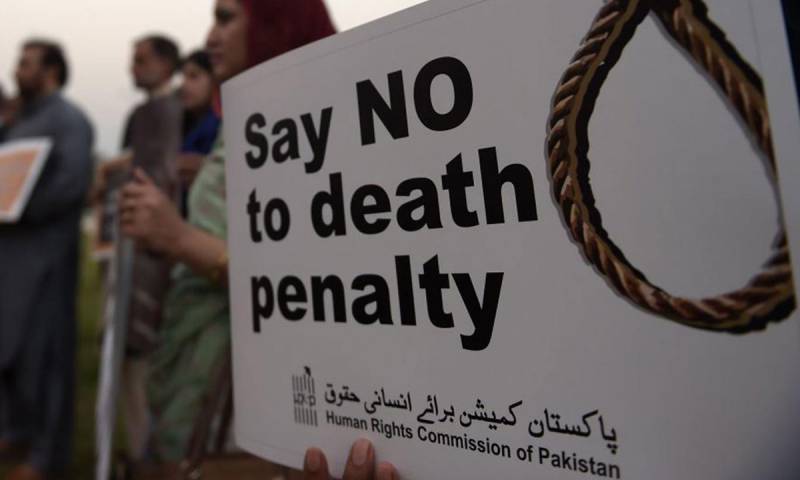
ISLAMABAD: Justice Project Pakistan (JPP) on Thursday launched a book ‘The Death Penalty in Pakistan: A Critical Review’ which is the first-ever full-length publication on the use of the death penalty in the country.
A culmination of 10 years of Justice Project Pakistan’s work, the book documents the many ways in which Pakistan's application of the death penalty intersects with legal, social, and political realities. It focuses on how capital punishment impacts some of the most vulnerable populations, such as juveniles, the mentally ill, persons with physical disabilities, low-wage migrant workers imprisoned in foreign jails, and the indigent.
“We are not sure that the death penalty is a deterrent in Pakistan, but what we are sure is that the death penalty is irreversible,” EU Ambassador to Pakistan Jean-François Cautain said in his keynote address.
“Some years ago, two people were acquitted by the Supreme Court of Pakistan after they were executed. This is a miscarriage of justice. Though Pakistan’s GSP + status does not hinge on Pakistan abolishing the death penalty, capital punishment should be reserved for the most serious crimes and follow due process. At the very least, the moratorium on the death penalty should be reinstated as soon as possible,” he added.
The address was followed by a dramatic reading by renowned actor Sarmad Khoosat of letters written by death row prisoners.
A panel discussion featuring eminent speakers including child rights activist Valerie Khan, PPP General Secretary Farhatullah Babar, PTI lawmaker Maleeka Bokhari and a former death row prisoner Arshad was also held at the launching ceremony.
“Unfortunately in Pakistan, the death penalty does not apply to militants or the rich and powerful, it only applies to the poor and the marginalised who get entangled in the broken justice system,” Babar told the audience.
Bokhari said: “I recently met the prime minister and he has expressed a desire to establish a committee for prison reforms. We are also working on improving the process of reviewing mercy petitions. It is important that as a government protect the most vulnerable populations of our country.”
The event was attended by government functionaries, human rights activists, eminent lawyers, and the civil society.
As is documented throughout this book, police routinely coerce defendants into confessing, often by torture. More worryingly, courts admit and rely upon such evidence. Poor defendants must rely on attorneys who typically provide only cursory and ineffective representation. Once sentenced, defendants lack effective recourse to post-conviction relief, even in the face of new exonerating evidence. The book aims to identify key issues in the system and help drive policy decisions for systemic change.
JPP Executive Director Sarah Belal said: “Pakistan’s application of the death penalty throws up more questions than answers. This book is part of a larger effort to make information and analyses on the death penalty more accessible. We hope this text will appeal to lawyers, journalists, academics, rights activists and anyone with an interest in understanding the practice of capital punishment along with its structural and systemic problems.”
A culmination of 10 years of Justice Project Pakistan’s work, the book documents the many ways in which Pakistan's application of the death penalty intersects with legal, social, and political realities. It focuses on how capital punishment impacts some of the most vulnerable populations, such as juveniles, the mentally ill, persons with physical disabilities, low-wage migrant workers imprisoned in foreign jails, and the indigent.
“We are not sure that the death penalty is a deterrent in Pakistan, but what we are sure is that the death penalty is irreversible,” EU Ambassador to Pakistan Jean-François Cautain said in his keynote address.
“Some years ago, two people were acquitted by the Supreme Court of Pakistan after they were executed. This is a miscarriage of justice. Though Pakistan’s GSP + status does not hinge on Pakistan abolishing the death penalty, capital punishment should be reserved for the most serious crimes and follow due process. At the very least, the moratorium on the death penalty should be reinstated as soon as possible,” he added.
The address was followed by a dramatic reading by renowned actor Sarmad Khoosat of letters written by death row prisoners.
A panel discussion featuring eminent speakers including child rights activist Valerie Khan, PPP General Secretary Farhatullah Babar, PTI lawmaker Maleeka Bokhari and a former death row prisoner Arshad was also held at the launching ceremony.
“Unfortunately in Pakistan, the death penalty does not apply to militants or the rich and powerful, it only applies to the poor and the marginalised who get entangled in the broken justice system,” Babar told the audience.
Bokhari said: “I recently met the prime minister and he has expressed a desire to establish a committee for prison reforms. We are also working on improving the process of reviewing mercy petitions. It is important that as a government protect the most vulnerable populations of our country.”
The event was attended by government functionaries, human rights activists, eminent lawyers, and the civil society.
As is documented throughout this book, police routinely coerce defendants into confessing, often by torture. More worryingly, courts admit and rely upon such evidence. Poor defendants must rely on attorneys who typically provide only cursory and ineffective representation. Once sentenced, defendants lack effective recourse to post-conviction relief, even in the face of new exonerating evidence. The book aims to identify key issues in the system and help drive policy decisions for systemic change.
JPP Executive Director Sarah Belal said: “Pakistan’s application of the death penalty throws up more questions than answers. This book is part of a larger effort to make information and analyses on the death penalty more accessible. We hope this text will appeal to lawyers, journalists, academics, rights activists and anyone with an interest in understanding the practice of capital punishment along with its structural and systemic problems.”
